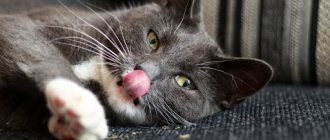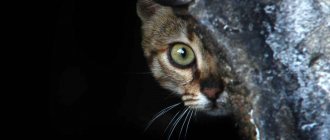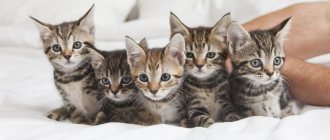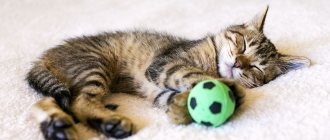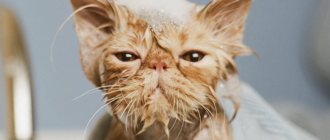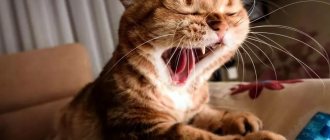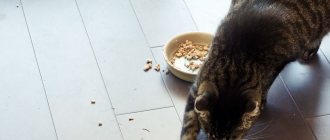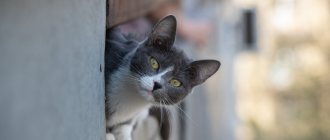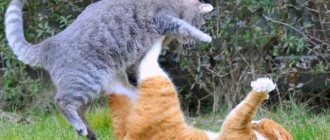≡ Home → Valerian → About valerian →
Almost all cats love valerian and, under its influence, begin to behave inappropriately. Animals practically go crazy just when they smell the plant. They do not want to move away from the place where the drops were poured; they begin to purr, fawn over their owner, or, conversely, run around the apartment and tumble. Owners often notice this reaction by accidentally spilling the tincture or leaving a bag of herbal tea containing valerian on the table.
The behavior of cats that smell valerian really becomes inappropriate, but the attack of such “euphoria” ends quite quickly for them.
Seeing the behavior of a cat that has tried valerian, you might think that it is dangerous for its health. For example, the animal may salivate profusely, even creating the impression that it is having some kind of seizure.
However, valerian preparations do not pose any obvious danger to cats. Moreover, it is sometimes used in veterinary medicine as a medicine, but only in very small dosages. And as we will see later, some other plants can cause a similar reaction.
Why cats love valerian and what happens to them
The specific reaction of animals to substances containing valerian root is known mainly from practical observations. Valerian for cats is an energy drink, a sleeping pill, and a deadly drug in one bottle.
And everything happens in exactly this order:
- after taking valerian, the cat experiences a short period of hyperactivity;
- then the pet becomes lethargic and drowsy;
- and if the cat does not wake up for a long time - sometimes up to 2 days - you need to invite a veterinarian and save the animal.
Application in veterinary medicine
The effect of valerian on cats is completely different from that on people, but it is also sometimes used in veterinary medicine. In very small doses it can be prescribed for:
- Diseases of the gastrointestinal tract;
- Diseases of the nervous system;
- Diseases of the endocrine system.
Valerian acts on animals as an aphrodisiac. It affects the central nervous system and indirectly affects other organs and systems of the animal’s body. Valerian also contains substances that can affect the production of hormones in cats.
Valerian is also used as a stimulant if young cats behave too passively. Sometimes veterinarians recommend adding a little valerian to animals' food to improve appetite and digestion.
In any case, valerian is a medicine that has a strong effect on cats, which triggers a number of physiological reactions in the animal’s body. It’s not worth giving it to animals for fun, to see what happens to them. A dosage that is considered small and safe for humans may be too large and dangerous for an animal.
Interesting video: a cat’s reaction to valerian tincture
Why cats love valerian: the general process
Cats love valerian because it contains actinidin (a group of pheromones). Pheromones form behavioral algorithms associated with social and genetic processes. Cats like valerian for a completely natural reason - it works as an amplifier of “friend or foe” signals.
It sounds complicated, but in reality it looks much simpler. It is enough for an animal to sniff a drug containing actinidin, and its brain receives a signal about the close presence of representatives of a related tribe.
Valerian for cats is an impulse to mark territory, take a dominant position on it and show sexual desire.
A drop of valerian “kills a lion”: can you give it to a cat?
The power of valerian is demonstrated by the fact that large wild cats - lions, leopards, lynxes and other felines - are also susceptible to the effects of this destructive plant.
Their behavioral symptoms are the same as those of domestic cats. Imagine how much larger a lynx, not to mention a lion, is than your pet, so if you keep valerian at home to relieve symptoms of nervousness or insomnia, try to keep the drug out of reach of cats.
It should, however, be noted that in rare cases, valerian for cats is prescribed as a tonic for excessive lethargy, but the dosage must be carefully calculated by a specialist.
The effect of valerian on cats: the similarity of the smells of feline and actinidin
To understand the mechanics of the process in more detail, you need to remember such a component of cat marks as feline. It is found in the urine of sexually mature individuals and serves as a natural marker. The reason cats love valerian lies precisely in the similarity of two fragrant aromas: feline and actinidin.
Animals simply confuse them.
Well, subsequent excitement is just a natural reaction of the body to the presence of a stranger cat nearby. Instincts and behavioral stereotypes come into play.
The animal mechanically performs a ritual programmed by nature. This is due to the almost identical effect of valerian on cats in all cases.
Valerian acts on cats for a limited period of time. Due to the too high concentration of actinidin, it causes a violent reaction and quickly takes away the animal’s strength, putting it into a state of apathy and drowsiness.
Do all cats have this reaction?
It is also useful to read: Is it possible to drink valerian during pregnancy?
Valerian is liked by many cats, but not all. For example, only 70% of domestic cats react to it, while 30% remain indifferent to valerian. Kittens under 12 months of age are least sensitive to the smell of the plant, and cats of reproductive age are the most sensitive. As for catnip, its influence also does not apply to all pets. Scientists suggest that catnip causes a hallucinogenic and psychotropic reaction only in those cats who have a special gene. If animals do not have it, they do not show the slightest interest in the plant.
Valerian also affects large representatives of the cat family, and its effect on them is also explained by the similarity of the odors of feline and actinidin. However, in large animals the effect of valerian is much less pronounced. This is primarily due to the size of the animals and the dose of valerian. In natural conditions, cats can find grass or roots, but will not consume them in large quantities. For a domestic cat, even one tablet of valerian or a spoonful of decoction is a serious dose, but for a tiger or leopard this same amount will be unnoticeable.
On a note
Valerian and catnip are used by scientists and filmmakers who observe wild animals in natural conditions. The smell of these herbs helps to attract cats to the shooting locations.
Does it affect everyone the same: the effects of valerian on different cats
All animals react to the drug individually:
- A third of cats do not feel the effects of valerian. For them it is a normal smell, unremarkable and neutral. Even a kitten under the age of six months will not show interest in him - he is still far from reaching sexually mature instincts. Siamese cats will not be impressed by valerian. This breed does not react to actinidin odors.
- Another 30% express an average degree of involvement - short-term activity is replaced by an equally quick rest and return to normal behavior.
- The remaining group is a riotous madness. Valerian should not be given to such cats. The animal will experience severe emotional stress and a long period of rest.
The final group is at risk due to the “valerian hangover” syndrome. As soon as he comes to his senses, the cat will begin to look for the source of the remembered smell.
The active ingredient of valerian has a stronger effect on male cats. The fact is that the feline content in their urine is 4 times higher than in cats.
How to influence a cat with valerian
In addition to treatment, some owners use the plant to accustom them to scratching posts and litter boxes, as well as to calm their pets during estrus. Due to the possible harm, the safety of these actions remains a big question.
Training to a scratching post or tray
It is better to accustom him to the toilet and scratching post from childhood. The plant has no effect on kittens, so it is better to choose safer and more effective drugs. Drops are suitable for adult animals, but it is better not to abuse such a training tool.
Is Valerian good for calming cats?
Reducing sexual desire by stimulating it is a disastrous idea. After valerian, cats become even more excited. Their behavior is very difficult to predict, and an incorrectly selected dosage can cause addiction in the animal.
If the smell of a volatile substance can deceive the pet, creating the illusion of the presence of the opposite sex, then such an effect will be short-lived. It won't solve the problem, so it's best to see a veterinarian.
In all cases, sterilization remains the most effective solution. The operation not only eliminates sexual desire and the ability to conceive, but also prevents the development of cancer.
Behavior of cats after taking valerian: symptoms and consequences
Two categories tolerate contact with the drug quite neutrally, and they do not experience discomfort after the cessation of its action. Representatives of the first group simply avoid the intrusive odor, while the second easily tolerate both the active stress phase and the passive exit from it.
Things are worse for animals from the third group. It will not be difficult to give such a cat a drink of valerian. But to return it to normal, you will have to make an effort.
In addition to long sleep, the following will appear:
- symptoms of poisoning;
- lack of coordination of movements;
- apathy, indifference to games and communication;
- lack of interest in food or physical inability to eat it.
Sometimes, due to the use of valerian, aggressive habits develop and the character of the animal changes.
For cats, valerian is a highly dangerous drug. It is risky to offer it to your pet without a good reason and a veterinarian’s prescription.
Effect of valerian for cats
The effect of valerian on animals is great. Having noticed or smelled the grass, they try to damage it, roll on it, extract liquid juice and begin to lick it. Then they go into a rage, start rolling on the ground or jumping, meowing loudly, etc.
Kittens and valerian
For your information! Valerian officinalis has a long history. Its root is used in herbal medicine, pharmacology, folk and official medicine. Translated from Latin, the word means “to be healthy, strong.” For cats, the plant is not a medicine. Rather, it causes alcohol or drug intoxication.
Effect of valerian on cats
The plant was first used as a perfume; it is known that Cleopatra placed its petals around her love bed. Later, noticing that valerian has a sedative, calming, and anticonvulsant effect on humans, it began to be used as a medicine.
Many cases have been described of cats acting wildly if they smelled this grass nearby. However, studies have shown that valerian does not have such a strong effect on all felines. One third of them do not react at all to the herb, the remaining two thirds also vary in sensitivity to valerian. The plant affects the most emotional cats in the following way: they begin to:
- rub your muzzle or nose on a plant or bottle that emits a scent;
- tumble;
- jump;
- shake your head;
- rub against the floor;
- meow heart-rendingly;
- lick fur;
- salivate.
In severe cases, there is a lack of coordination, a hallucination develops, an inadequate reaction, etc.
Even a few drops of valerian causes aggression in animals. It seems to them that they are being attacked, persecuted, so often pets either hide in cramped, dark corners, or behave viciously. They attack the owners, tear furniture and curtains, trying to climb onto the closet or other higher places.
Note! Essentially, valerian is for cats what drugs are for humans.
Is it possible to give a cat valerian: medicine or poison?
Much depends on the form of the drug. It is produced for humans and is therefore available in 3 forms: tincture, tablets and dry herb collection.
- If prescribed by a veterinarian, the cat is given a dried herbal composition - it is safer than others.
- In the absence of a decoction from a collection of dry herbs, valerian in tablets is preferred. In this case, allergies and mild malaise are the most expected and harmless consequences. Therefore, if you decide to give valerian in tablets, you should take into account that the medicine includes synthetic components.
- The most powerful effect will be if the cat is given valerian in alcohol. Cats do not have an enzyme that breaks down alcohol in their bodies, so they will get used to ethyl quickly. Giving cats an alcohol solution of valerian is strictly prohibited. Even a small dose received by licking can have a devastating effect on the internal organs of the animal.
Valerian tablets need to be ground into powder for a cat - if you give a whole piece, it will take a long time to dissolve in the gastrointestinal tract.
Benefits of valerian
Valerian is useful for cats only with a prescription from a specialist for the following medicinal purposes:
- correction of thyroid disorder;
- treatment of gastrointestinal diseases;
- stimulation of cardiac muscle activity;
- (sometimes) stimulating sexual activity in young animals during the first mating.
The benefits of valerian for a cat are clearly visible in stressful situations when transporting long distances: it calms the animal and makes it less susceptible to external irritating factors.
Valerian can have a calming effect on a cat.
Is valerian harmful for cats?
No permanent negative effects of the drug have been reported. The harm or benefit of valerian for a cat is always determined by the individual characteristics of the body.
- Some animals experience swelling of the mucous membranes from the first use.
- Valerian is more harmful to male cats due to excessive stimulation of sexual desire.
How does valerian affect cats?
global $ads_google;
//data-ad-slot=”2475549904″ $ads_google = empty($ads_google) ? false : true; ?> if ($ads_google == false) {?> $ads_google = true; ?> } ?> If you offer a cat drops of valerian and observe it, you can conduct a whole study. Valerian for cats is a special remedy: it doesn’t matter what kind of cat lives in the house - even the sweetest quiet one can be compared to a noisy rowdy of a night bar in a couple of seconds.
The effect of the drug on different pets is different: some cats will howl, while others will simply roll meaninglessly on the floor for a long time, cats may suddenly begin to mark corners, and a lazy pet will suddenly begin to climb up the wallpaper and curtains.
Since the medicine acts like a drug, it is not surprising that animals experience intoxication, hallucinations and disorientation in space. Sometimes cats feel like house lions and rush at an invisible opponent, or rush around as if running away from someone. It doesn’t matter whether the cat was old, sedentary or nimble: in any case, the behavior of the intoxicated creature will be different.
Animals change before our eyes: the hitherto cute four-legged purr suddenly begins to show aggression, seems angry, insane, and now he is rushing to bite his beloved owner.
Some pussies, on the contrary, become sluggish: even their gait becomes sluggish and unsteady. Such cats fall asleep quickly and dream for a long time. This behavior is also characteristic of secondary behavior for those animals who, after smelling valerian, first behaved violently and went crazy.
How much valerian can you give a cat?
The amount of valerian that can be given to a cat is calculated based on its weight, size, physical condition, temperament and diagnosis made by a veterinarian.
When self-treating, it is not recommended to let the animal out of sight until it has fully returned to normal active activities. Any deviation from the norm is viewed with a negative assessment - even in small quantities, the effect of valerian on cats is unpredictable.
Before using the medicine, the animal should be fed. Giving a cat valerian on an empty stomach is strictly not recommended.
Why do cats like valerian?
For representatives of the cat breed, valerian is a drug. Cats that are fed dangerous treats for a long time eventually begin to look like inveterate drug addicts: emaciated and unkempt. The wool loses its shine, the animals lose weight.
The period of euphoric excitement is replaced by a deep, long sleep in pets. It has been experimentally proven that valerian can cause severe drug intoxication in a cat, and increasing the dose can be fatal.
Animals can no longer forget the pleasure they receive from the “cat drug” and will again and again beg for the coveted medicine. Among other things, valerian can cause pleasant sexual arousal in them and awaken the sexual instinct.
The herb is also known to relax gastrointestinal spasms, so it is likely that cats periodically require it as a remedy for abdominal pain. This means that in small proportions, valerian can be useful for them.
So, the stage-by-stage reaction of cats to valerian looks like this:
- playful or aggressive agitation;
- long sleep;
- apathy and lethargy.
Overdose symptoms
Characteristic features of the negative effects of the drug are visible from external signs of behavior or changes in habits:
- Toxic damage. Profuse salivation begins, foam appears around the mouth, vomiting and convulsions occur. The development of the process moves towards the respiratory organs and cardiac muscle. Severe spasms and stroke are possible.
- Persistent aggression, rapid mood swings, changes in socialization markers. For a cat, valerian becomes the goal of an incessant search, and its absence puts the animal out of psychological balance.
- Damage to internal organs. The first sign is blood in the urine and feces, manifestations of painful sensations. Often characterized by prolonged stomping in one place and purring. In this way, the animal independently produces an analgesic hormone and tries to overcome physical suffering.
Any differences from standard behavior should be a reason to immediately contact a veterinarian.
Can an overdose happen?
In addition to an allergic reaction, the animal may experience an overdose. It is accompanied by:
- complete loss of coordination;
- falling on the side;
- rolling your eyes;
- convulsions;
- copious discharge of foam from the mouth.
If these signs appear, you must immediately take your pet to the veterinary clinic. Otherwise, he may die from cardiac arrest.
To avoid overdose, strictly follow all doctor's recommendations and do not self-medicate. Remember that all medications should be kept out of the reach of pets.
What can be replaced: a harmless alternative
It is not necessary to deprive your pet of the joy of short-term hormone production. Valerian does not possess this quality alone - its substitutes are both gentler and safer.
We are talking about plants that are informally grouped into the catnip group:
- catnip;
- budra;
- common scent.
Having found such a bush, cats begin to rub against it, trying to damage the stem and lick the odorous juice. But the harm of this liquid is not commensurate with the effect of valerian, and the arousal effect passes quickly and without consequences.
Catnip is often used as a filler in toys or sold separately in pet stores. And if you buy it, you won’t have to risk your pet’s life to give him a couple of extra minutes of joy.
Conclusion: to give or not to give?
The use of valerian for cats for medicinal purposes is practiced very rarely and only as part of auxiliary therapy. In most cases, it is safer to use alternative medications and herbs.
When is Valerian good for cats?
The use of roots and decoctions is permissible for thyroid dysfunction, fever, intestinal spasms, neuroses and muscle atony. In addition to preventing serious pathologies, the herb can help increase activity and restore appetite.
The disadvantages of the plant outweigh its advantages. When treating pets, it is better to use safer drugs, the reaction to which is easier to predict.
Alternative plants
Instead of valerian, it is better to buy catnip (catnip) for cats. It has a similar stimulating effect on the body, but its effect is more gentle. To get the effect, it is enough for the animal to sniff and not swallow the mint. This eliminates the possibility of dependence.
Most often, dried mint is added to toys. After switching attention to another object, the pet comes to its senses within 10-15 minutes. Training with mint is less effective, but safer. The disadvantage of this plant is that a very small percentage of cats experience euphoria from it.
As a sedative, it is recommended to use drops and sprays with pheromones (No Stress Spot On, Feliway). These drugs are made from natural ingredients, so in the absence of allergies, they can be used to modulate behavior.
Knowing all the possible dangers, you should not check what will happen when a cat and valerian meet. This meeting can leave a lasting impression on a mustachioed pet, making him addicted to a harmful tincture. Remember that this practice can result in death. It is better to buy your pet a toy with catnip or consult a doctor for a prescription for a safer drug.
The article is for informational purposes only. Contact your veterinarian!
Valerian or catnip?
Today, pet stores sell soft toys scented with catnip, an herb that cats like just as much as valerian. It’s not for nothing that this plant is called “catnip.” Contact with it leads the animal into a state of strong excitement.
The essential oil component of catnip, nepetalactone, is a source of delight. American researchers have concluded that it is absolutely harmless to cats. It is noteworthy that this plant does not cause any reaction in kittens and some adults.
Scientists admit that when inhaling odorous substances emanating from a phytonarcotic, mature cats receive sensations similar to those experienced by a person when smoking marijuana. They lick and bite the fragrant plant, roll on the ground, rub their heads against nearby objects, and purr or meow loudly. After 10 minutes, the euphoria passes, but the state of depression and other negative consequences do not occur.
Veterinarians do not recommend catnip-based products for internal use as a recreational activity. However, a toy that smells like catnip is quite suitable for relieving stress.
Cats after valerian: changes in behavior
If the gene does not mutate in a cat’s body, then the smell of valerian causes euphoria in him and affects the nervous system of males, as it is similar to the smell of pheromones in the urine of females. A strong sexual instinct awakens in the males, and the cats begin to hunt.
Changes in behavior in cats
Typically, the symptoms of a cat under the influence of drugs or alcohol are as follows:
- they purr loudly;
- rubbing their head on the floor and other objects;
- meow loudly;
- running around the house.
Then comes the relaxation phase:
- cats become uninitiative;
- huddle in a corner, hide under the bed;
- falls asleep quickly.
In this state, animals should get as much sleep as necessary. You shouldn’t wake them up, and they won’t wake up voluntarily. The next day, the pet will forget about the drink and will again become a cute kitten. This is what happens if you give a cat valerian.
Will the product help calm a cat during heat, or keep a roaming cat at home?
Sometimes, with the help of valerian, owners try to calm a cat during heat. As already mentioned, it does not have a sedative effect on animals, however, even in these cases it is sometimes effective. Since the aroma of valerian rhizomes resembles the smell of a substance contained in the urine of cats and is perceived by them as a pheromone, the cat can calm down a little thanks to the illusion that there is a cat nearby.
You can only give the cat a sniff of the dry rhizome or its decoction. You should not give your cat valerian. In this case, it will only have an exciting effect. When letting your pet smell the drug, you also need to take into account that it may not calm her down. Some cats, on the contrary, may become even more excited and begin to meow incessantly, calling for the cat. It is best to replace valerian with special sedatives for cats.
Since valerian does not have any long-term effect, it cannot be used to keep an animal at home.
As for cats, trying to wean them from hanging out with the help of valerian is practically useless. If you drop a couple of drops of tincture somewhere, the animal will most likely sniff the object and stay near it for a long time. The very next day, without such a stimulus, the cat may run away again. You can’t give him valerian all the time, as the cat can get used to it and then constantly ask for it. It can also have a bad effect on his well-being and behavior.
It is also useful to read: Valerian officinalis: interesting facts about this plant
Is it beneficial for a cat to inhale valerian?
Watching your pet's wild joy is, of course, funny and interesting. However, it must be borne in mind that valerian is an extremely dangerous plant for it. Zoologists often call it “cat drug.” It causes auditory and visual hallucinations: the pet hears and hides from an imaginary enemy. Sometimes the effect of the drug does not go away for several days: the cat is afraid of any rustle, stops eating and drinking, and does not sleep. There may be another reaction: a gentle and calm cat turns into a wild predator who is ready to attack the owner.
Interesting facts about cats:
- A cat's heart beats twice as fast as a human's.
- The surface of a furry pet's nose is unique, like human fingerprints.
What happens if you give a cat a taste of valerian?
Most often, prankster owners offer their pets to try a treat soaked in valerian extract. This drug is infused with alcohol, and the cat will simply get drunk if he tries it. In addition, the pet will subsequently constantly ask for this “delicacy”, because the addictive effect develops after the first time.
Interesting: The fastest cats in the world - list, names, maximum speed, description, photos and videos
What are the dangers of overdose?
There have been cases when a cat drank a bottle of valerian tincture. Then only a veterinarian will save the animal, and that’s not a fact. The pet suffers from convulsions, foam comes out of the mouth, and the pupils of the eyes increase in size. A cat with a weak psyche may die from a stroke or respiratory arrest. The spectacle is not for the faint of heart.
Is it possible to accustom a cat to a litter box or scratching post using valerian?
Sometimes, with the help of valerian, they try to accustom a kitten to a tray or scratching post, and this quite often turns out to be ineffective. About 30% of cats are not sensitive to the smell of valerian. Kittens under the age of 12 months react least to it, and it is advisable to accustom animals to something at a young age.
Older cats can be attracted to the scratching post with valerian. To do this, just drop a few drops of decoction or infusion of rhizomes on it. You can also use tincture. In this case, you can first pour it into some container and leave it for a while so that the alcohol disappears.
The alcohol in valerian tincture is even more harmful to the cat, and therefore, whenever this product is used, the alcohol must be removed.
The liquid drug should be applied to the scratching post in a very small dose. Do not forget that the smell of valerian has a stimulating effect on cats, and this is not at all beneficial for them. It is also believed that valerian can be addictive in cats even after just one use. Wanting to feel the aroma of the plant again, the cat may constantly return to the scratching post, while he may also begin to meow more, demanding medicine, and become more aggressive.
It’s also not worth using valerian to lure a cat into a carrier. Before traveling, you need your pet to be completely calm. Valerian, on the contrary, will put him into a state of excitement.
Why Valerian Attracts Cats
Seeing how the behavior of cats changes after consuming this plant, zoologists decided to figure out why cats love valerian, and made several conclusions:
- They like it because of the similarity of the smell of the plant and the smell of hormones present in cat urine. In animals, the level of hormones in the blood increases, up to euphoria.
- The root of the plant contains the substance actinidin, which is addictive in the cat family, that is, it acts like a drug and the cat cannot tear himself away from valerian.
- There is also an opinion that long ago, when cats lived in the wild, they used this plant as a painkiller.
